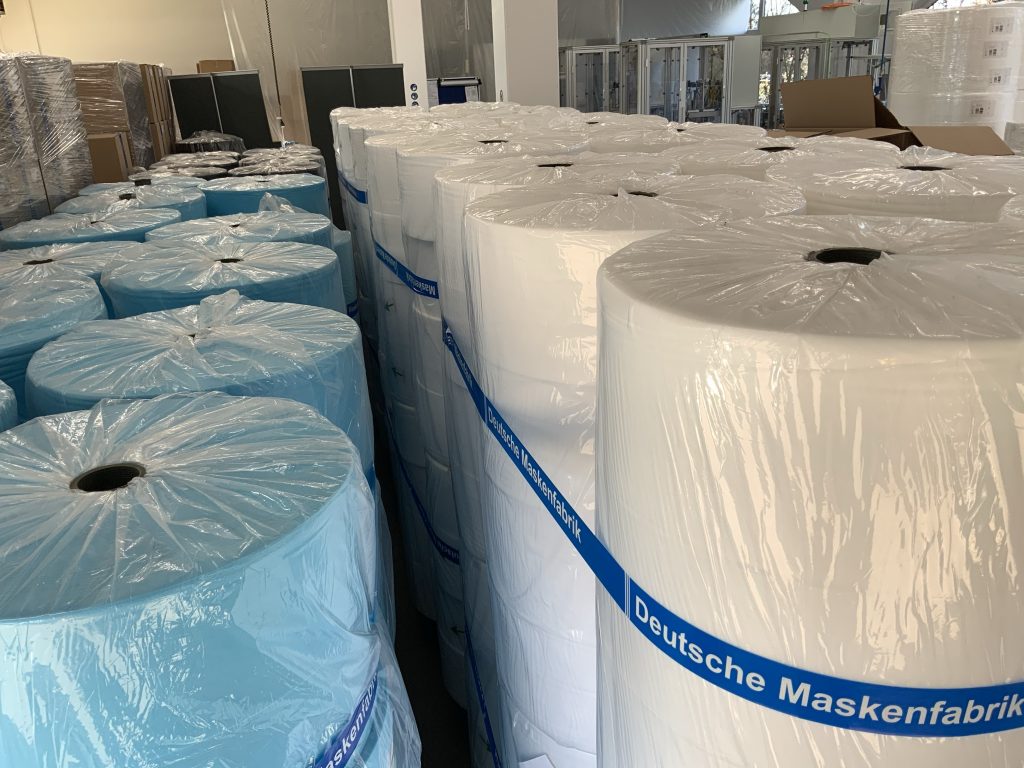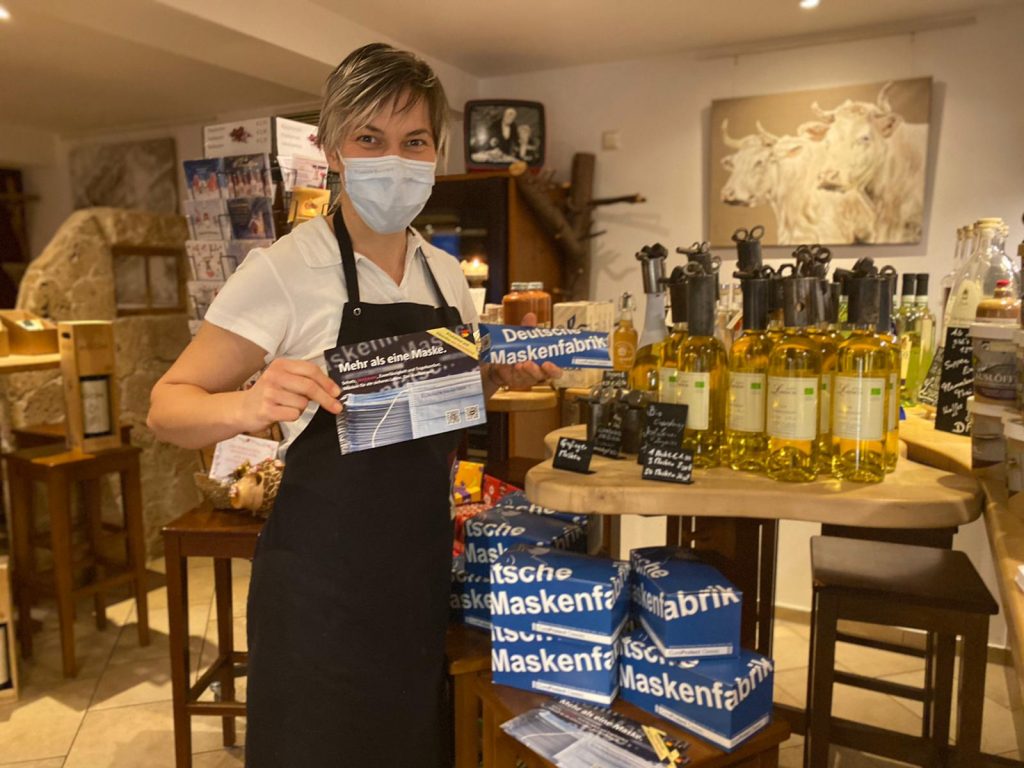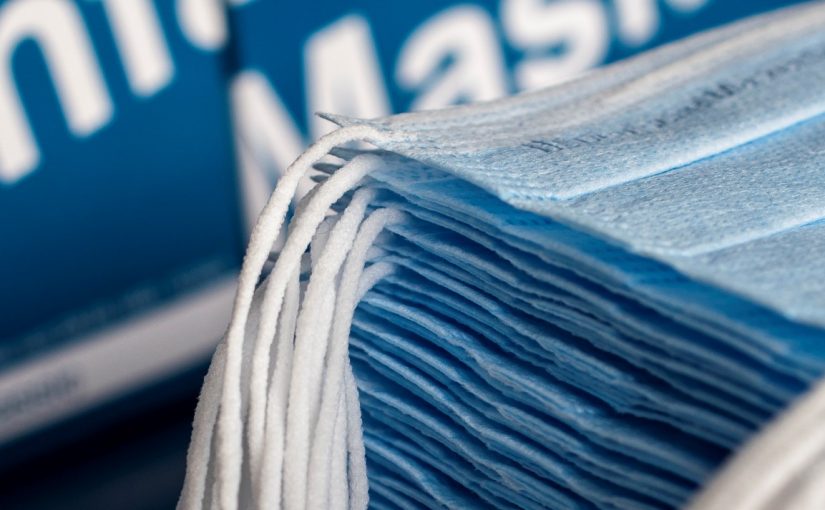About a year ago, Corona began to become an all-encompassing and omnipresent part of our lives. During the loosening phase of summer 2020, I was amazed when my college friend Christian Herzog placed a pack of mouth-nose masks on my desk. "Made in Germany," he said, "I now have my own factory." As the evening went on, it turned out that this was no joke - here's the 1st part around the start-up idea. Because I think it's very exciting to act in such a dynamic environment and also to create something good with it. The 2nd part is about the foundation itself: what drives you to take such a step, how did the planning go, what problems did you encounter and what happens next?
Christian, you are co-founder, co-owner and managing director of "Deutsche Maskenfabrik" since 1.9.2020. You produce medical mouth-nose protection masks (MNS) in Germany. What goals are you pursuing with this?
Our goal is to make ourselves less dependent on Asian imported masks and to offer people in Germany a safe, high-quality product that they can trust and that protects them. That's why, for example, we only use fleece materials made in Germany for our masks. And our customers notice the difference immediately - the masks are much more comfortable to wear, don't smell and the earbands hold. Furthermore, it is also important to us that we produce as sustainably as possible. For example, we do not pack in plastic bags but in classic folding cardboard boxes and we are working on take-back and recycling concepts for bulk buyers of our masks to reduce the waste generated by the used masks.

We see enough experts on TV. However, you are working on the implementation and have intensively familiarized yourself with the topic of COVID 19. How do you assess the pandemic and what is still to come?
You can see quite clearly from the infection figures that the current, very tough measures are helping and the numbers are going down. So I hope that the lockdown can be brought back down a little bit soon. Also, I think the spring and summer will bring us some relief. We've already seen in 2020 that infection numbers go down when it gets warmer. On the other hand, the virus is not just going to go away. We can see how difficult it is and how long it takes to vaccinate the entire population. I am therefore afraid that COVID 19 will keep us busy for the whole year and beyond. Moreover, mutations of this virus have already occurred and there will probably be new pandemics in the future.
On the other hand, this pandemic will also change us as a society. I am convinced that, for example, air travel and travel, especially in business, will not come back as strongly as it did before the pandemic. Businesses and employees have seen how digitization can help them work efficiently, even without having to physically meet in the same room all the time. And that will bring change. For some it will be positive, for others rather less so, when I think of hotels that live off business travel, for example. But last year, we achieved our climate targets for the first time - ultimately due to the two lockdowns and the reduced travel. An exceptional situation such as this global pandemic always offers opportunities to bring about change.
Wearing masks is common practice in Asia, for example, even without a pandemic. Because it simply helps to avoid infections, especially where many people meet closely. At my former employer, we sometimes had sickness-related absences of up to 35% of the staff in some areas during a normal winter. Last winter, this was significantly less due to the Corona-related hygiene measures (spacing, hand washing, wearing masks). Therefore, I believe that masks in particular will have a place in our daily lives even after the pandemic. Certainly not for everyone, but there will be people in Germany who will attach importance to quality and local production and that is ultimately the area we are fighting for and which we would like to cover with our products.

As a professional, what is your opinion: which masks will help us, why and how?
In Germany, we actually distinguish 3 types of masks in public:
- OP or medical MNS masks - these are the masks that you know from the hospital, rectangular with these typical folds. Surgical masks have actually been tried and tested for decades and are made precisely for infection protection. If the masks are well made, i.e. the material doesn't stink and doesn't scratch and the ear straps are soft, then I can usually wear them comfortably for a longer period of time. And this is therefore also the mask that I would recommend in normal everyday situations.
- Then there are the FFP masks, which are currently on everyone's lips ... or above everyone's lips. They actually come from the field of occupational safety and not at all from medicine and are primarily used to protect against dust and other harmful substances, such as those that occur during grinding. FFP2 masks are also suitable for protection against infection and I would recommend them wherever I either have a particularly high risk of infecting myself or others or want to pay particular attention to protection. So e.g. in nursing homes, doctors' surgeries, etc. FFP2 masks protect particularly well, but they are also not as comfortable to wear and hinder breathing significantly more. Without a mask break, this can quickly become uncomfortable and also harmful for the wearer. Therefore it is always a weighing. In normal cases, for example in the office, I would rather advise to wear a surgical mask as often as possible and to change it more often, because they are also much cheaper than FFP2 masks.
- And then in Germany there is the term of the everyday mask or the makeshift mask. This is actually not a special type of mask, but the term originates from the first lockdown in March last year, when there were not enough surgical masks for everyone. That's when the politicians asked that we leave the good surgical masks for the medical staff and help ourselves, e.g. with homemade masks. This is how the term everyday mask or mouth-nose-covering came into being. This term actually stands for all other types of masks that have no specific proven protective effect. So from simple self sewn fabric masks, ski masks or even special fabric masks with filter inserts to a simple scarf that I pull over my mouth. These makeshift masks are currently only allowed in a few areas in Germany. In most areas, either an OP mask or an FFP2 mask is currently prescribed, both of which have a proven protective effect and of course both protect the wearer as well as others.

One thought on "Interview: the pandemic as an opportunity - my own COVID19 mask factory, part 1"